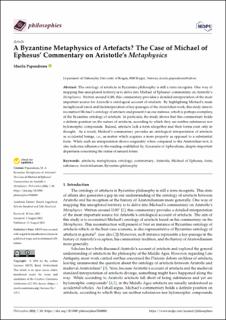| dc.contributor.author | Papandreou, Marilu | |
| dc.date.accessioned | 2022-09-07T06:48:19Z | |
| dc.date.available | 2022-09-07T06:48:19Z | |
| dc.date.created | 2022-08-22T22:06:01Z | |
| dc.date.issued | 2022-08-11 | |
| dc.identifier.issn | 2409-9287 | |
| dc.identifier.uri | https://hdl.handle.net/11250/3016137 | |
| dc.description.abstract | The ontology of artefacts in Byzantine philosophy is still a terra incognita. One way of mapping this unexplored territory is to delve into Michael of Ephesus’ commentary on Aristotle’s Metaphysics. Written around 1100, this commentary provides a detailed interpretation of the most important source for Aristotle’s ontological account of artefacts. By highlighting Michael’s main metaphysical tenets and his interpretation of key-passages of the Aristotelian work, this study aims to reconstruct Michael’s ontology of artefacts and present it as one instance, which is perhaps exemplary, of the Byzantine ontology of artefacts. In particular, the study shows that this commentary holds a definite position on the nature of artefacts, according to which they are neither substances nor hylomorphic compounds. Indeed, artefacts lack a form altogether and their forms exist only in thought. As a result, Michael’s commentary provides an ontological interpretation of artefacts as accidental beings, i.e., as matter which acquires a mere property as opposed to a substantial form. While such an interpretation shows originality when compared to the Aristotelian text, it also indicates adherence to the reading established by Alexander of Aphrodisias, despite important departures concerning the status of natural forms. | en_US |
| dc.language.iso | eng | en_US |
| dc.publisher | MDPI | en_US |
| dc.rights | Navngivelse 4.0 Internasjonal | * |
| dc.rights.uri | http://creativecommons.org/licenses/by/4.0/deed.no | * |
| dc.title | A Byzantine Metaphysics of Artefacts? The Case of Michael of Ephesus’ Commentary on Aristotle’s Metaphysics | en_US |
| dc.type | Journal article | en_US |
| dc.type | Peer reviewed | en_US |
| dc.description.version | publishedVersion | en_US |
| dc.rights.holder | Copyright 2022 the author | en_US |
| dc.source.articlenumber | 88 | en_US |
| cristin.ispublished | true | |
| cristin.fulltext | original | |
| cristin.qualitycode | 1 | |
| dc.identifier.doi | doi.org/10.3390/philosophies7040088 | |
| dc.identifier.cristin | 2045135 | |
| dc.source.journal | Philosophies | en_US |
| dc.identifier.citation | Philosophies. 2022, 7 (4), 88. | en_US |
| dc.source.volume | 7 | en_US |
| dc.source.issue | 4 | en_US |

